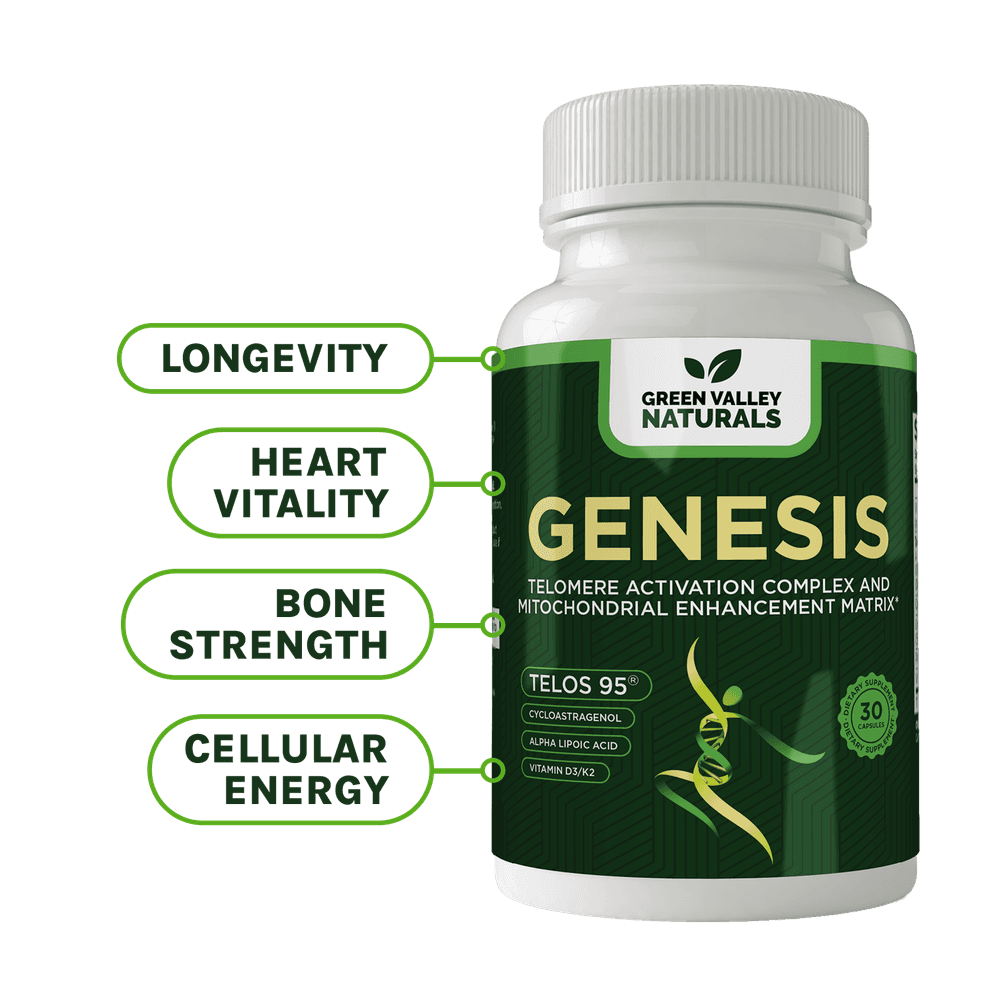
Discover How to Reverse Aging and Restore Cellular Function For a Longer Life
Aubrey de Grey is on a mission. As one of the world’s leading biomedical gerontologists he intends to defeat aging. In fact, he believes the first person to live to the age of a thousand has already been born.
He may sound overtly optimistic or even crazy, but then again describing a smartphone and it’s capabilities would have seemed unbelievable not too long ago.
As with computing technology, recent advances in aging research suggest that turning back the clock on Father Time may be on the horizon, and even if you can’t take advantage of it just yet, you can certainly incorporate strategies today to slow down the process of aging to live a longer life in better health.
Key Takeaways
Recent advances in science have enabled the possibility of aging backwards.
Gene therapy, iPSCs, telomerase activators, and senescence suppressors are potential treatments for reversing cellular aging.
Practical strategies such as healthy lifestyle habits which include diet and nutrition, exercise, stress management and sleep can help slow down the aging process.
What is The Cause of Aging?

Over 2000 years ago Aristotle speculated aging was caused by the gradual cooling of our internal organs. The ancient Chinese believed it was caused by the loss of a vital essence stored in the kidneys. Modern theories put it down to wear and tear, genetic mutations, DNA copying errors and more.
If science hasn’t determined the cause of aging, how can we slow it down, let alone stop or reverse it? Although no single event can be pointed to as the cause, aging involves a complex and dynamic series of events each of which can be acted upon.
In 2013 Carlos López Otín and colleagues from Spain drew up a list of nine hallmarks of aging which were expanded to twelve in 2023. To represent a common denominator of aging each characteristic had to manifest in normal aging and each had to shorten or lengthen lifespan if they were aggravated or ameliorated respectively under experimental conditions.
The hallmarks that show the most promise for targeting by anti-aging treatments are as follows...
Gene Therapy

Gene therapy is a powerful technique that aims to modify a person’s genes to treat or cure diseases.
As we've previously reported, in 1993 it was discovered that a mutation in a single gene called daf-2 could double the lifespan of the C. elegans worm. It was the dawn of the modern age of life extension. By 2003, further tinkering with the gene extended it by six-fold and later by ten-fold. Another mutated gene named chico extended the lives of flies by almost 50 percent.
When these genes mutate they limit the amount of insulin that can get into the cell. This sets off an alarm which activates another gene called FOXO that switches on a battery of protective genes.
Researchers found that genetically knocking out an insulin receptor in mice protected them from disease in a broad range of tissues and the mice remained youthful and sprightly. This implies, according to aging scientist Linda Partridge, from University College London (UCL), “that we really have hit something about the underlying aging process.”
Humans have four FOXO genes and in one study those who inherited FOXO3A experienced much better health, less disease, and a considerably longer life. Over 300 human genes are now known to affect lifespan and the general view is that 20 to 30 percent of our natural lifespan is down to our genetic heritage, while environmental influences account for the rest.
Geneticist David Gems, also from UCL, believes the message from genetic research is that “aging is plastic. It’s not fixed. It’s something that is alterable.”
Aging Research: Induced Pluripotent Stem Cells
Induced pluripotent stem cells (iPSCs) are adult cells that have been reprogrammed to possess the capability to differentiate into various human cells. The discovery was made in 2006 when Japanese stem-cell scientist Shinya Yamanaka discovered that just four proteins added to human adult cells could wipe clean their epigenetic marks – chemical switches that turn genes on and off.
By doing so the memory of whether they were a skin cell, a liver cell, an eye cell, etc., is erased and they revert to a primitive state, giving them a fresh start. The pairing of epigenetic programming and stem cells means the cells can be turned into any other body cell. Mice have had their lives extended by 30 percent using this technique.
Since there’s a danger with this method that the cells can turn cancerous, a new technique uses chemical compounds to create iPSCs without erasing the cell’s identity. Human cells were rejuvenated in less than a week using six chemical cocktails in a recent study. Promising results were previously shown in various human tissues, with improved vision and extended lifespan in mice and reversal of blindness in monkeys.
David Sinclair, the Harvard Medical School scientist who led the new study, said, "The new discovery offers the potential to reverse aging with a single pill."
Telomerase Activators

The natural lifespan of cells ends after about 50 cell divisions. But how do cells know they’ve reached their limit? Scientists have discovered that this is due to the shortening of telomeres, the protective caps at the end of chromosomes. In cells that don't divide, length can be maintained thanks to an enzyme called telomerase. If the enzyme could be applied to cells that do have a limit, which is almost all of them, they theoretically wouldn’t age.
Telomerase has been applied to human cells and tissues to reverse aging and one product called TA-65 is commercially available. It's shown modest improvement in clinical biomarkers but work continues to find activators with more dramatic rejuvenation effects. Then there's our very own revolutionary telomere support formula, Genesis. It contains Telos95 which is shown in a recent study at Princeton Consumer Research to support telomere health.
Genesis also contains a clinical dose of cycloastragenol, an herb at the root of the natural anti-aging movement that provides potent telomerase support. Finally, Genesis also contains the antioxidant support of alpha lipoic acid and a Vitamin D3 and K2 combo, a powerful combination shown in clinical studies to support your DNA's "power plant," mitochondria.
Suppressing Cellular Senescence
There are two strategies to prevent the damage caused by cells that live in a non-dividing state, spewing out toxins that damage surrounding cells. As we've reported before, one is to develop agents called senolytics that will kill them off, another is to rejuvenate these age-promoting cells, so they function normally again.
In preclinical models, interventions targeting senescent cells delayed, prevented, or alleviated multiple disorders. A small human trial found clinically meaningful improvement in physical function in patients with pulmonary fibrosis. Around another 17 trials are in progress, all targeted at a particular disease of aging such as osteoarthritis or Alzheimer’s disease.
The Longevity Escape Velocity Foundation (LEV) was founded by Aubrey de Grey in 2022. “Our mission,” he said, “is clear: the medical defeat of aging via damage repair.”
The foundation aims to address the hallmarks of aging. Rather than focus on just one area to target, the approach of the foundation is to repair or remove the damage that underlies the aging process. Simultaneous therapies would be deployed that independently address each of the distinct classes of damage that occur. In this way people can stay in good health for much longer.
LEV's research focus is on the application of a comprehensive rejuvenation medicine program to people in mid and late life. De Grey is hopeful the program will deliver dramatic results in the near future.
Practical Strategies for Age Reversal

It’s likely we’ll see some major breakthroughs over the next decade, but nothing is certain. But even if they do arrive, there's no need to wait when there’s so much we can do right now. As already explained, genes are only a small part of the story. It’s how the genes are expressed – epigenetics – that’s far more important, and we have a lot of control over this.
We all age at different rates, meaning that our biological age – the age of our cells, tissues, and organs - can be different from our chronological age. We can’t change our age since birth but it’s possible to lower our biological age via epigenetics. This can be achieved through dietary and lifestyle changes.
We previously reported on a ground-breaking clinical pilot trial on lifestyle interventions that included 43 healthy men aged between 50 and 72. Half were asked to eat a range of healthy foods, exercise, take time to relax, and engage in good sleep hygiene practices. The other half received no intervention.
In just eight weeks on the program the biological age of the active group was reduced by an average of 3.28 years compared to controls.
A small follow-up trial was published in March 2023. This time six middle-aged women completed the program over eighteen weeks and enjoyed an average decrease in their biological age of 4.6 years.
The lifestyle program focuses on a particular epigenetic process called DNA methylation which puts molecules known as methyl groups on top of your genetic material. Some scientists consider DNA methylation to be the most powerful epigenetic influence among many. In fact, measuring methylation can reveal your aging pace.
Let’s look at the lifestyle program in more detail.
Nourishing Genetic Expression Through Food

The most important examples of food sourced methyl donors are:
Folate - liver, chickpeas, beans, legumes, mushrooms, spinach, eggs
Vitamin B12 – liver, beef, fish, clams, eggs
Betaine – beets, spinach, quinoa, liver
Choline – eggs, liver, lentils, cauliflower
We also need DNA methylation adaptogen nutrients to inhibit genes we don’t want from being turned on and encourage those we do want turned on so a healthy, balance is achieved.
Nutrient adaptogens are vitamins A, C, and D3. The other category of adaptogens are flavonoids. There’s a very wide range of these. A diet containing vegetables, fruits, nuts, seeds, herbs, and spices will contain many flavonoid adaptogens such as anthocyanin, catechin, fisetin, lycopene, quercetin and resveratrol.
The methyl donors and adaptogens are incorporated into a diet that leans towards keto, high in vegetables and healthy fats, moderate in protein, and relatively low in carbs as no or few grains are eaten.
Exercise and Physical Activity

Regular exercise is another key factor in maintaining a youthful biological age and is great nourishment for DNA methylation. Resistance training and high intensity interval training (HIIT) can help preserve muscle mass, stimulate hormone production, and promote cardiovascular health. Engaging in compound exercises such as squats, deadlifts, bench presses, and pull-ups can further boost hormones and reverse the aging process.
Additionally, cardio activities like spin classes, sprints, or CrossFit classes can help control weight and strengthen the heart and lungs.
Sleep and Stress Management

Harvard Medical School has reported that adequate sleep and effective stress management techniques are essential to maintain a healthy biological age, prevent numerous age-related diseases and slow aging.
In fact, sleep deprivation has been associated with an increase in inflammatory markers, which are linked to cardiovascular disease, hypertension, and Type-2 diabetes. Tips to invite restorative sleep include, making the bedroom dark, keeping the room cool and avoiding blue-light (no screens) for some time before retiring.
Stress is also detrimental to aging. It's linked with shortened telomeres and increased oxidative stress, both of which are indicators of reduced longevity. Stress management techniques are essential and include:
mindfulness meditation
yoga
deep breathing
progressive muscle relaxation
Incorporating such strategies can help mitigate the impact of stress on aging and overall health.
Future Prospects and Human Trials

The future of age reversal is incredibly promising, with many human trials for age-reversing treatments either in progress or on the horizon. These trials have the potential to revolutionize the way we approach aging and age-related diseases, offering hope for improved health and a longer, more vibrant life.
Summary
In conclusion, the quest to reverse aging has taken significant strides in recent years, with ground-breaking scientific advancements and practical lifestyle strategies offering hope for a more youthful, vibrant future. By staying informed and adopting a proactive approach to your health that includes lifestyle change, you can embrace the potential of age reversal and redefine what it means to age gracefully.
Frequently Asked Questions
What are the latest scientific advancements in age reversal?
Recent advancements offer promising solutions to age reversal, such as gene therapy, removing senescent cells, induced pluripotent stem cells and chemical cocktails targeting cellular aging. But perhaps just as promising are the diet, nutrition, and lifestyle changes that are shown in clinical studies to reduce biological age. These solutions have the potential to revolutionize the way we think about aging and extend our lifespans.
What practical lifestyle changes can help reverse aging?
Adopting a healthy diet rich in fruits, vegetables, lean protein and whole grains, exercising regularly, sleeping soundly and managing stress can help reverse biological aging and improve overall health. By the way, many studies show you need a combination of all of these together, not just one or some to effectively reverse biological age.
Are there any upcoming human clinical trials for age-reversing treatments?
Yes, human trials for age-reversing treatments are underway, including gene therapy, offering the potential to revolutionize aging and the treatment of numerous age related diseases. These treatments could potentially extend life expectancy and improve our quality of life.
Armstrong S (2019) Borrowed Time - The science of how and why we age. London: Bloomsbury
Fitzgerald KN (2022) Younger You - Reduce Your bio age and live longer, better. London: Quercus
Fitzgerald KN et al. (2023) Potential reversal of biological age in women following an l8-week methylation-supportive diet and lifestyle program: a case series. Aging https://pubmed.ncbi.nlm.nih.gov/36947707/
Longevity Escape Velocity Foundation (2023) Available at https://www.levf.org
López Otín C et al. (2023) Hallmarks of aging: An expanding universe. Cell http://www.sciencedirect.com/science/article/abs/pii/S0092867422013770
Yang J-H et al. (2023) Chemically induced reprogramming to reverse cellular aging. Aging http://www.aging-us.com/204896/text

